Hungry for help: refugees in Kenya feel the effects of recent food cuts
KAKUMA REFUGEE CAMP, Kenya, January 9 (UNHCR) – Nyachot squints up at the midday sun above Kakuma Camp as she stirs the daily meal for her family. Before last November, the 34-year-old South Sudanese refugee could cook twice a day. But when the World Food Programme cut rations by 50 per cent that month, she feared for her children’s future.
“The food does not even last the two weeks that it should,” Nyachot told UNHCR visitors, turning to gaze at her baby son. Like thousands of other women at this camp in north-west Kenya, she relies completely on the rations she receives, in the absence of any other source of income. Full rations were later resumed on January 1, but the situation remains serious and fresh funding is needed to avert the risk of further cuts in the future.
Nyachot fled South Sudan in February last year, after fighting intensified between government forces and rebels. Desperate to save her children, she embarked upon an arduous weeklong journey that took her from her home in Maiwat, Upper Nile state to Nadapal, the border entry point to Kenya.
Her eyes filled with tears as she recalled the trauma. “I travelled by boat with about 40 other people for five long days to Juba and then took a bus from there to Nadapal,” she said. “My children were hungry and thirsty.”
When they finally arrived in Nadapal, UNHCR officials and other humanitarian agencies were there to greet them with energy biscuits and water. Later, at Kakuma’s reception centre, they received hot meals, sleeping bags and a place to sleep, before being transferred to Kakuma 4, the new settlement area for South Sudanese arrivals.
For Nyachot, finding refuge in Kakuma and receiving food assistance was a huge relief. Non-food items, such as blankets, cooking utensils, an energy stove and jerry cans, were also supplied and helped her family settle into their new home. But with the food ration cuts in November, Nyachot’s concern quickly began to grow.
In one of the nearby mud houses, Stephen and Gawar shared similar worries. They fled Pangak in South Sudan’s Jonglei state and, like Nyachot, sought refuge in Kakuma. “The situation is very bad,” observed Stephen, interviewed before full rations were resumed last week. “We eat once a day and the food can get finished after five days. Some of our people are even thinking of going back home. It is not an ideal solution, but people are desperate.”
Nyagai, their 36-year-old neighbour, concurred. “Once the rations run out, I survive by begging for food from my neighbours,” she says. “It is a shame to do so but what option do I have?”
Her friend, Nyapel, smiled sadly when she revealed that she could not breastfeed her 11-month-old son due to a medical condition. “I have to sell part of my meagre rations so as to buy milk for him. If I don’t this, then my son will not survive.”
After the ration cuts took effect in November, concerted efforts were made by World Food Programme to raise additional funding and restore full rations – and this was possible at the start of the month. But the funding situation remains uncertain and WFP and UNHCR have issued joint appeals to donors for help.
Meanwhile, UNHCR and partner NGOs continued to engage with refugees through their community leaders to assure them of continued support during November and December. These efforts were a result of the recent joint Inter-Agency Regional Appeal for the South Sudan Emergency Response.
Although refugees had been assured that this was a temporary situation, they remain concerned. “If the food cuts continue, many people will suffer, especially the elderly, the women and children,” said Gawar. Stephen believed that their hope lies with UNHCR.
As she turned back to her cooking, a glimmer of hope flickered in Nyachot’s eyes. She, at least, believed that things would get better; if not for her then at least for her children.
Page 2 of 18
-
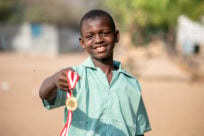
Football keeps young refugees’ dreams alive in Kenya’s Kakuma camp
8 Apr 2024 -
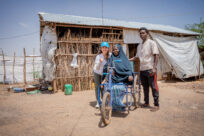
UNHCR Goodwill Ambassador Yang Yang visits refugees in Kakuma
28 Mar 2024 -
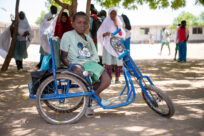
Global education fund transforming lives in Kakuma Camp
26 Mar 2024 -
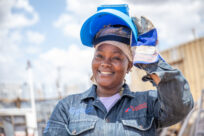
Congolese welder forges a formidable path
8 Mar 2024 -
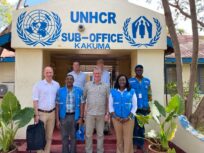
Refugee inclusion is key to new Danish partnership in Turkana County
9 Feb 2024Kakuma – In support of the local development plan for Turkana West sub-County, refugee inclusion and better health for all is at the centre of a new Danish partnership Inclusive Refugee Response Partnership. This week, UNHCR Kenya hosted two of the Danish partners, the Novo Nordisk Foundation and the Danish Ministry […]
-
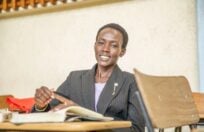
My Journey: How education helps refugee girls break the cycle of hardship
8 Sep 2023Monicah Malith fled conflict in South Sudan as a girl and moved to Kenya, where she overcame challenges to continue her education and is now a law student the first female refugee President of the University of Nairobi Students Association.
-
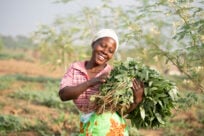
Hope for women as farming project bears fruit in Kenya
24 Aug 2023Manirakiza and other farmers are busy plowing their piece of land in perfect sync, occasionally pausing to greet the other farmers. The Burundian refugee’s routine has been the same since she was allocated the piece of land at the Choro farm five years ago. “I didn’t think farming would be […]
-
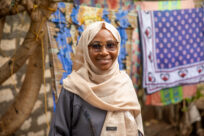
Hope for Pemba community as they gain recognition as Kenyan citizens
23 Aug 2023Barke Hamisi always felt she was a Kenyan, until her first encounter with the stigma of statelessness. Nearly three decades later, she can finally say, “I belong.”
-
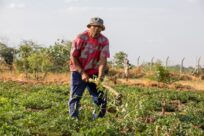
Thriving refugee farm cooperative gives hope in Kenya’s Kakuma camp
20 Jun 2023Kenya’s increasingly inclusive policies are giving refugees the opportunity to not only rebuild their lives but also to thrive and give back to their host community.
-
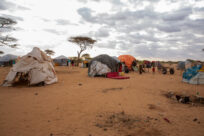
Kenya’s Dadaab struggles with new influx of Somalis fleeing drought
2 Jun 2023Drought and conflict in Somalia have pushed more people to seek safety in Kenya’s Dadaab refugee camp, where residents were already suffering after five failed rainy seasons.
